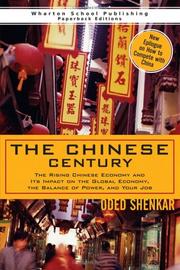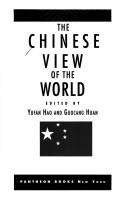| Listing 1 - 10 of 134 | << page >> |
Sort by
|
Book
ISBN: 9780465028283 Year: 2012 Publisher: New York : Basic Books,
Abstract | Keywords | Export | Availability | Bookmark
 Loading...
Loading...Choose an application
- Reference Manager
- EndNote
- RefWorks (Direct export to RefWorks)
Book
ISBN: 0913449210 Year: 1990 Publisher: New York : Institute for East-West Security,
Abstract | Keywords | Export | Availability | Bookmark
 Loading...
Loading...Choose an application
- Reference Manager
- EndNote
- RefWorks (Direct export to RefWorks)
Book
ISBN: 9781409447092 1409447103 1472403274 140944709X Year: 2013 Publisher: Farnham Ashgate
Abstract | Keywords | Export | Availability | Bookmark
 Loading...
Loading...Choose an application
- Reference Manager
- EndNote
- RefWorks (Direct export to RefWorks)
In contemporary discourse on China-Africa relations, there are, on the one hand, the Sino-pessimists who see China as a giant vacuum-cleaner, sucking up Africa's resources in order to fuel its own rapid industrialization, and destroying Africa's development potential in the process. On the other hand, the Sino-optimists see China as the ultimate savior of Africa, capable of or willing to 'develop' the continent. Between the two divergent schools of thought are those sitting on the fence for the time being, the Sino-pragmatists, who are less sanguine for sure about what Africa would gain from China-Africa relations, but are nevertheless willing to reserve judgment until the dust settles. This book is innovative in two ways: it introduces a regional approach to the study of China-Africa relations by focusing on Eastern and Southern Africa; and it puts forward a disciplinary framework- disciplinary in both senses of that term- for interrogating the burgeoning literature about China-Africa relations by conceptualizing the three schools of thought mentioned above.
International relations. Foreign policy --- East Africa --- Southern Africa --- China --- Foreign relations --- Foreign economic relations --- China - Foreign relations - Africa, Eastern --- China - Foreign relations - Africa, Southern --- China - Foreign economic relations - Africa, Eastern --- China - Foreign economic relations - Africa, Southern

ISBN: 0131877313 9780131877313 Year: 2006 Publisher: Upper Saddle River, N.J. : Wharton School Pub.,
Abstract | Keywords | Export | Availability | Bookmark
 Loading...
Loading...Choose an application
- Reference Manager
- EndNote
- RefWorks (Direct export to RefWorks)
Book
ISBN: 9782213655574 Year: 2010 Publisher: Paris : Fayard,
Abstract | Keywords | Export | Availability | Bookmark
 Loading...
Loading...Choose an application
- Reference Manager
- EndNote
- RefWorks (Direct export to RefWorks)
Book
ISBN: 1299456758 0199860157 9780199860159 9780199860142 0199860149 0199323690 9780199323692 9781299456754 9780199361038 0199361037 Year: 2013 Publisher: Oxford New York Oxford University Press
Abstract | Keywords | Export | Availability | Bookmark
 Loading...
Loading...Choose an application
- Reference Manager
- EndNote
- RefWorks (Direct export to RefWorks)
"Most global citizens are well aware of the explosive growth of the Chinese economy. Indeed, China has famously become the "workshop of the world." Yet, while China watchers have shed much light on the country's internal dynamics--China's politics, its vast social changes, and its economic development--few have focused on how this increasingly powerful nation has become more active and assertive throughout the world. In China Goes Global, eminent China scholar David Shambaugh delivers the book that the world has been waiting for--a sweeping account of China's growing prominence on the international stage. Thirty years ago, China's role in global affairs beyond its immediate East Asian periphery was decidedly minor and it had little geostrategic power. As Shambaugh charts, though, China's expanding economic power has allowed it to extend its reach virtually everywhere--from mineral mines in Africa, to currency markets in the West, to oilfields in the Middle East, to agribusiness in Latin America, to the factories of East Asia. Shambaugh offers an enlightening look into the manifestations of China's global ambitions: its extensive commercial footprint, its growing military power, its increasing cultural influence or "soft power," its diplomatic activity, and its new prominence in global governance institutions. But Shambaugh is no alarmist. In this balanced and well-researched volume, he argues that China's global presence is more broad than deep and that China still lacks the influence befitting a major world power--what he terms a "partial power." He draws on his decades of China-watching and his deep knowledge of the subject, and exploits a wide variety of previously untapped sources, to shed valuable light on China's current and future roles in world affairs"-- "In China Goes Global, eminent China scholar David Shambaugh delivers the book that the world has been waiting for--a sweeping account of China's growing prominence on the international stage. Thirty years ago, China's role in global affairs beyond its immediate East Asian periphery was decidedly minor and it had little geostrategic power. As Shambaugh charts, though, China's expanding economic power has allowed it to extend its reach virtually everywhere--from mineral mines in Africa, to currency markets in the West, to oilfields in the Middle East, to agribusiness in Latin America, to the factories of East Asia. Shambaugh offers an enlightening look into the manifestations of China's global ambitions: its extensive commercial footprint, its growing military power, its increasing cultural influence or "soft power," its diplomatic activity, and its new prominence in global governance institutions. But Shambaugh is no alarmist. In this balanced and well-researched volume, he argues that China's global presence is more broad than deep and that China still lacks the influence befitting a major world power--what he terms a "partial power." "--
Globalization --- China --- Foreign economic relations. --- Economic policy --- E-books --- Globalization - China. --- China - Foreign economic relations. --- China - Economic policy - 2000 --- -Globalization
Book
ISBN: 1616687916 9781616687915 9781606929940 1606929941 Year: 2010 Publisher: Hauppauge, N.Y. Nova Science Publishers
Abstract | Keywords | Export | Availability | Bookmark
 Loading...
Loading...Choose an application
- Reference Manager
- EndNote
- RefWorks (Direct export to RefWorks)
Year: 2022 Publisher: Edward Elgar Publishing,
Abstract | Keywords | Export | Availability | Bookmark
 Loading...
Loading...Choose an application
- Reference Manager
- EndNote
- RefWorks (Direct export to RefWorks)
In recent decades, China has become a world leader in e-commerce, e-currency, 5G, and artificial intelligence, cementing itself as a major competitor to established powers. Gerald Chan poses the question: How has China pulled this off? Arguing that the answer lies in the country's digital silk road, a multi-faceted programme to connect the world via digital means, the book explores how China has shaped the development of the digital order, secured a critical role in internet governance, and upset the status-quo powers. Integrating empirical research with innovative theory, this forward-looking book is the first of its kind to unravel the complex web spun through China's digital silk road. Chapters offer a unique Chinese perspective on the evolution of the global digital economy and digital currencies, highlighting China's growing influence in driving technological development and setting global industrial standards. Following on from Chan's previous publications on the country's high-speed rail networks and maritime infrastructure, China's Digital Silk Road offers a timely look at China's predominant role in shaping the global digital order. Advancing a geo-developmental framework to analyse China's Belt and Road Initiative, the book will be of unique interest to students and scholars of Chinese politics and global development.
Book
ISBN: 1118896017 Year: 2014 Publisher: Hoboken : Wiley,
Abstract | Keywords | Export | Availability | Bookmark
 Loading...
Loading...Choose an application
- Reference Manager
- EndNote
- RefWorks (Direct export to RefWorks)
A roadmap for understanding the business challenges and opportunities in China By 2025, China and India will be two of the world's four largest economies. By then, economic ties between them should also rank among the ten most important bilateral ties worldwide. Their leaders are well aware of these emerging realities. In May 2013, just two months after taking charge, Premier Li Keqiang left for India on his first official trip outside China, a clear signal of China's foreign policy priorities. The Silk Road Rediscovered is the first book ever to analyze the growing corporate

ISBN: 0679722831 0394577574 9780394577579 9780679722830 Year: 1989 Publisher: New York, N.Y. Pantheon Books
Abstract | Keywords | Export | Availability | Bookmark
 Loading...
Loading...Choose an application
- Reference Manager
- EndNote
- RefWorks (Direct export to RefWorks)
| Listing 1 - 10 of 134 | << page >> |
Sort by
|

 Search
Search Feedback
Feedback About UniCat
About UniCat  Help
Help News
News